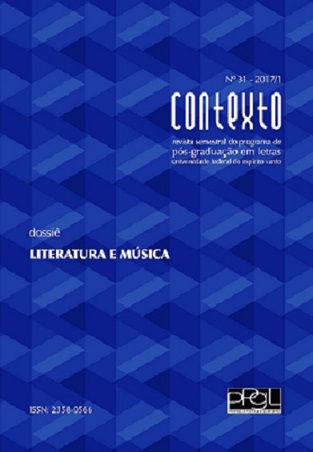“O sertão vai virar mar”, a reinvenção do sertão na poética da Música Popular Brasileira (1960-1970)
DOI:
https://doi.org/10.47456/contexto.v%25vi%25i.14935Resumo
RESUMO: A proposta deste artigo é investigar a constituição de uma tópica que se propaga em nosso imaginário social e que vai se manifestar como uma fecunda tradição temática na literatura e na canção popular brasileira ao longo do século XX: a representação cultural do “sertão”. Um “sertão” onipresente que deve ser entendido como um “lugar de memória” (Nora,
1993) físico e, principalmente, um fecundo universo mítico e imaterial. Para tanto, tomaremos como método investigativo a constituição dos processos identitários das representações do “sertão” a partir do discurso musical de alguns de seus mediadores culturais entre as décadas de 1960 e 1970, em sua maioria, compositores e intérpretes nordestinos que, enquanto sujeitos sociais portadores de uma alteridade subalterna, vivenciaram uma profunda tensão civilizatória no trânsito entre os universos do “sertão” e da “metrópole” através de suas experiências
diaspóricas (Hall, 2008). Assim sendo, reconheceremos a “reinvenção do sertão” na construção do nosso imaginário social brasileiro como a manifestação de uma suspeita paradigmática face à modernização autoritária entre os anos 1960 e 1970, naquilo que denominamos como “malestar civilizatório” nos trópicos.
PALAVRAS-CHAVE: Poética da canção. Estudos culturais. Música popular brasileira.
ABSTRACT: The purpose of this paper is to investigate the constitution of a topic propagated in our social imagination which manifested itself as a fertile thematic tradition in Brazilian literature and popular song throughout the twentieth century: the cultural representation of the Brazilian backlands, an omnipresent “sertão” that should be understood as a physical “place of memory” and, principally, as a mythical and immaterial universe. To do so, we will adopt as an investigative method, identifying processes of representations of the “sertão” based on the musical discourse of cultural mediators during the sixties and seventies, who were for the most part Northeastern composers and interpreters who, due to their subordinate otherness, experienced a deep civilizational tension between the worlds of the “sertão” and the “metropolis” through their own experiences of diaspora. We will therefore acknowledge the significance of the “reinvention of the backlands” in the construction of the Brazilian social
imagination, as the manifestation of a paradigmatic questioning of the authoritarian modernization of the 1960s and 1970s, in what we may term “the malaise of civilization” in the tropics.
KEYWORDS: Song Poetics. Cultural Studies. Brazilian Popular Music.
Downloads
Publicado
Edição
Seção
Licença
Copyright (c) 2021 André Rocha Leite Haudenschild

Este trabalho está licenciado sob uma licença Creative Commons Attribution-NonCommercial 4.0 International License.

Este obra está licenciado com uma Licença Creative Commons Atribuição-NãoComercial 4.0 Internacional.





